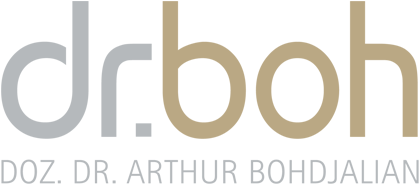ROUX-Y GASTRIC BYPASS (RYGB) AGAINST OBESITYObesity surgery in Vienna
Familial or genetic predisposition, unhealthy diet or lack of activity may be reasons for morbid obesity.
Various conservative treatment methods (e.g. change of nutrition or activity) may be helpful. Eventually however, surgery may help if the previous efforts have been unsuccessful.
The Roux-Y bypass is one of the most frequent surgical procedures in obesity surgery. Here, the focus is on a clear reduction of the stomach, combined with the bypass of the first intestinal segment. The surgery is done via 5 – 6 entry points into the abdominal wall.
This obesity surgical technique drastically reduces stomach size by separating a large part of the stomach from the rest just below the stomach entrance. Then, this residual stomach is connected directly to the small intestine. A reduction of the amount of food that can be ingested and the reduced absorptive capacity of the reminding intestine results in clear weightloss.
After surgery, it is necessary to take additional vitamins and minerals for the rest of one’s life.
| Short information | |
|---|---|
| Duration of surgery | Approx. 90 minutes |
| Kind of anesthesia | General anesthesia |
| Method | Minimally-invasive, laparoscopic |
| Sports possible after | Approx. 4 weeks |
Questions and answers on the Roux-Y-gastric bypass
The gastric bypass surgery separates the stomach in two portions: a small ‘residual stomach’ and a larger unused portion and divides also the small intestine. The residual stomach portion is connected to the small intestine bypassing duodenum and the first section of the small intestine. As digestive juices mix with ingested food (chime) later, both the amount of food and nutrient absorption are reduced.
It is generally advisable to keep a sensible diet. Since the bypassed segment would actually be have been in charge of the uptake of vitamins, minerals and trace elements, these nutrients will have to be supplemented to your diet. After gastric bypass surgery, there is higher sensitivity to alcohol as it rapidly transported into the liver. Therefore, care has to be implemented for regular drinking of alcohol, as it is a contraindication.
Experience shows that, over the first two years after surgery, it is possible to lose 50% - 70% of the excess weight.
Duration of surgery is approx. 90 minutes.
If conservative methods of weight reduction have been ineffective, this surgery is an worthwhile alternative.
You have questions or require a consultation
on Roux-Y-gastric bypass?
We are looking forward to your call. Please call +43-1-890 40 41 orcomplete our contact form.


